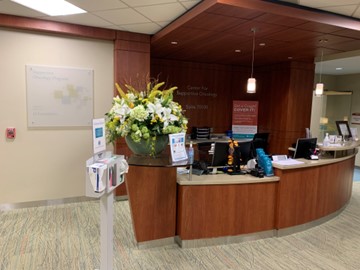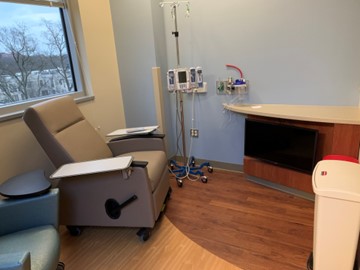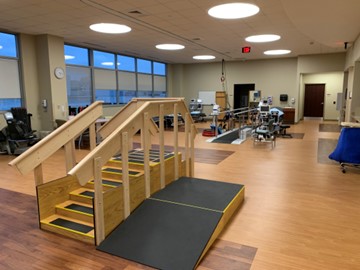Supportive Oncology Academic Fellowship
Overview
The Supportive Oncology Academic Fellowship at the Atrium Health Levine Cancer Institute (LCI) Department of Supportive Oncology (DSO) is designed to train next generation physician leaders to have expertise in the emerging field of Supportive Oncology.
The comprehensive post-graduate academic year offers the advantage of a guided learning experience and direct patient care. The fellow has exposure to the care of oncology patients primarily in the outpatient setting with clinical rotations in subspecialized clinics.
The curriculum allows the fellow to cultivate broad knowledge of the multidisciplinary approach to supportive care in cancer.
Fellows can choose between the one-year Supportive Oncology Academic Fellowship track OR a two-year academic fellowship track in Hospice and Palliative Medicine (year 1: ACGME) and Supportive Oncology (year 2: non-accredited).
The Department of Supportive Oncology has four established fellowship tracks to provide physicians and clinicians the skill sets and techniques needed to deliver patient-centered care: Hospice and Palliative Medicine (in partnership with Carolinas Palliative Care and Hospice Group), Supportive Oncology, Psycho-Oncology (clinical psychology) and Cancer Rehabilitation (in partnership with Atrium Health Carolinas Rehabilitation Charlotte).
For more information on any of the fellowships, please contact Lisette.Clementecline@AtriumHealth.org.
Where You Will Train
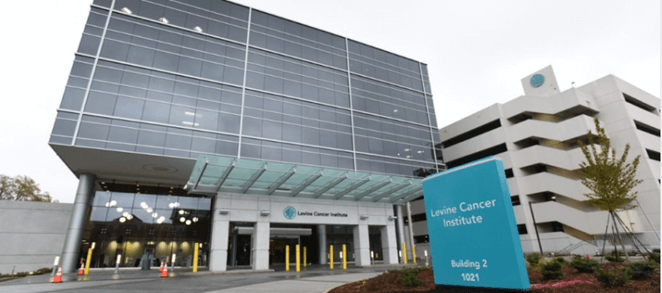
Center for Supportive Oncology, Levine Cancer Institute, Building 2
The Department of Supportive Oncology is chaired by Dr. Declan Walsh, Hemby Family Endowed Chair, and palliative medicine pioneer and visionary. DSO includes the Sections of: Oncology Palliative Medicine, Integrative Oncology, Cancer Rehabilitation, Oncology Nutrition, Psycho-Oncology, Cancer Navigation, Cancer Survivorship, Senior Oncology, Research and Education. DSO is an integrated, multidisciplinary team with 163 teammates and 30 medical staff.
The DSO research strategy centers around four thematic areas: Cancer Pain and Opioids, Malnutrition and Inflammation, Psycho-Oncology and Cancer Related Fatigue. Each area has a research taskforce, which is comprised of subject matter experts from the Department, Levine Cancer Institute, Atrium Health and strategic partners within the community. The purpose of each taskforce is to establish partnerships and develop research projects.
The 7th floor of LCI Building 2 is devoted entirely to supportive oncology services and is the largest square footage (33,000) devoted to supportive oncology in the world. In addition to a 4-bay palliative medicine infusion suite, the space houses a rehabilitation gym, an acupuncture suite and spaces for massage therapy and healing touch.
Features of the floor include a dedicated fellow office and a suite of conference rooms that overlook the Charlotte skyline; these rooms host administrative meetings, support groups, classes and other activities. There are nourishment stations with beverages and snacks positioned throughout the suite for use by patients, visitors and staff.
Levine Cancer Institute provides cutting-edge cancer care in a community, academic hybrid setting with 25+ locations throughout the region with strong referral streams in a large tertiary referral center and over 17,000 new patients per year. LCI’s academic and research headquarters and DSO reside on the Carolinas Medical Center (CMC) campus.
Carolinas Medical Center is the flagship hospital of Atrium Health and the largest hospital in the region. CMC serves as the region’s only Level 1 trauma center and is an approved transplant center for heart, kidney, pancreas and liver. With Wake Forest University School of Medicine serving as the academic core of the Atrium Health enterprise, CMC also serves as one of North Carolina’s 5 Academic Medical Center Teaching Hospitals. The Wake Forest University School of Medicine in Charlotte is slated to open in 2024.
Recognitions
The European Society for Medical Oncology (ESMO) honored Levine Cancer Institute as North Carolina’s only Designated Center of Integrated Oncology and Palliative Care. ESMO only bestows this honor on “cancer centers which provide comprehensive services in supportive and palliative care as part of their routine care” and who achieve a “high standard of integration” in doing so. Care is a team effort at LCI, whose supportive oncology team works in concert with the medical oncology team to provide the highest level of care for all patients. LCI joins only four other cancer centers in the United States as well as over 200 sites worldwide to be so recognized.
The Multinational Association of Supportive Care in Cancer (MASCC) recognized Levine Cancer Institute’s Department of Supportive Oncology as a MASCC Designated Center of Excellence in Supportive Care in Cancer. The certification program recognizes oncology centers that demonstrate best practices in supportive cancer care. MASCC’s certification program aims both to educate and to encourage a supportive care focus among oncology healthcare professionals.
The Commission on Accredited Rehabilitation Facilities (CARF) recognized Atrium Health, Levine Cancer Institute’s Cancer Rehabilitation program as the world’s first to earn accreditation in cancer rehabilitation.
Levine Cancer Institute is the only cancer center in the region to be nationally ranked by U.S. News and World Report.
Levine Cancer Institute is the first cancer network in the world to earn the top distinction in patient-centered care by excelling across more than 50 criteria of patient-centered care to be designated as a Planetree Patient-Centered Organization.
Meet the Faculty
-
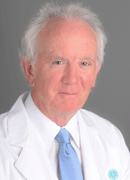 Declan Walsh, MD, MSc, FACP, FRCP(Edin)
Declan Walsh, MD, MSc, FACP, FRCP(Edin)Program Director; Chair, Department of Supportive Oncology; Professor of Medicine
Core Faculty
-
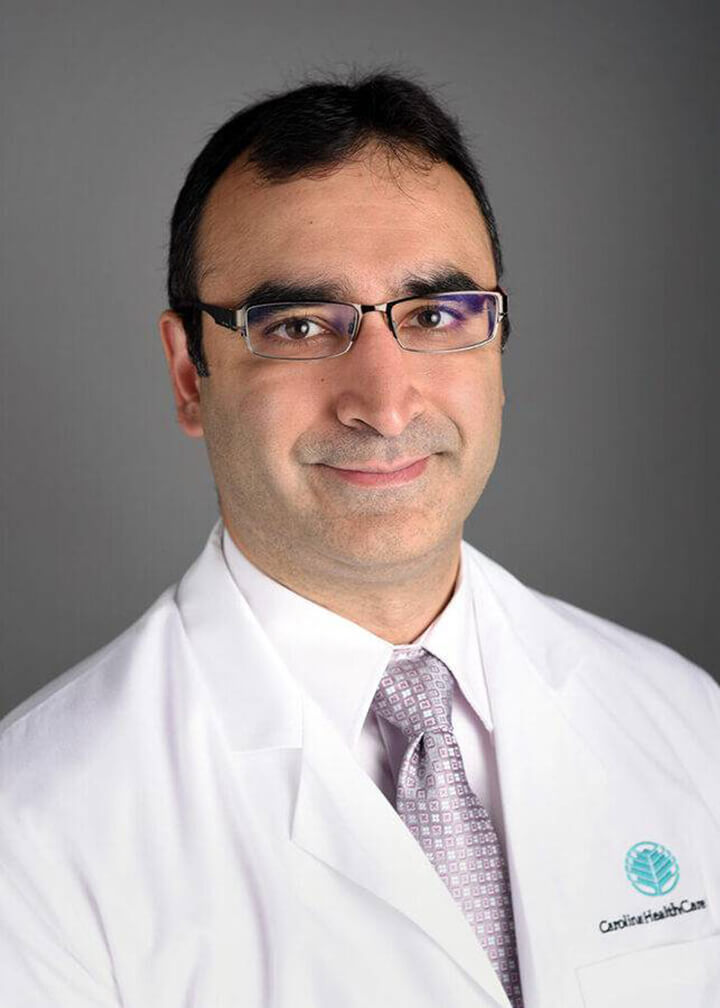 Vishwa Raj, MD
Vishwa Raj, MDChief, Section of Cancer Rehabilitation Department of Supportive Oncology Levine Cancer Institute
-
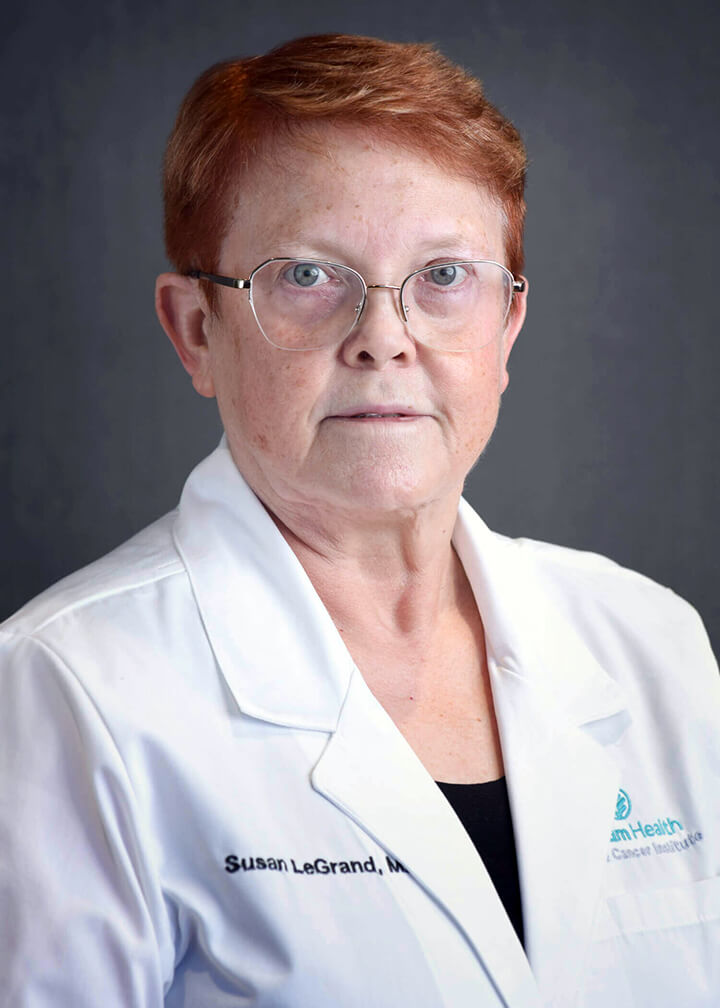 Susan LeGrand, MD, FACP, FAAHPM
Susan LeGrand, MD, FACP, FAAHPMPhysician – Department of Supportive Oncology Levine Cancer Institute
-
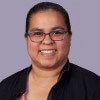 Lisette Clemente-Cline
Lisette Clemente-ClineProgram Coordinator, Hospice & Palliative Medicine and Supportive Oncology Fellowships, Department of Supportive Oncology
Curriculum
Supportive Oncology prevents and manages physical and psychological adverse effects of cancer and treatment from diagnosis through survivorship. The goal is to decrease symptoms, improve health facilitate recovery and nurture well-being through innovative programs and services.
The curriculum allows fellows to cultivate broad knowledge of the interdisciplinary approach to Supportive Care in the oncology setting. Fellows will work collaboratively with advance practice providers, nurses, medical assistants, pharmacists and other health professionals.
Rotation Schedule
Rotations in the Department of Supportive Oncology clinical sections:
- Cancer Navigation
- Cancer Rehabilitation
- Cancer Survivorship
- Cardio-Oncology
- Integrative Oncology
- Oncology Nutrition
- Oncology Palliative Medicine
- Psycho-Oncology
- Senior Oncology
- Elective
Rapid Access Service for Symptom Management
One full day per week seeing patients in a comprehensive, cancer-focused, on-demand consultation service for adult cancer patients with poorly controlled symptoms.
Protected research time
Weekly half day protected research time structured to provide practical research experience in study design and execution, manuscript preparation and grant writing.
Fellows will be assigned to a faculty member whose research interests most closely match those of the fellow. Faculty and fellow will work closely together in developing and conducting a series of research projects, designed to give the fellow practical experience in research methodologies.
Fellows are expected to prepare a presentation of findings for a national meeting (abstract submission/presentation) as well as write a manuscript for submission to a peer-reviewed journal.
Continuity Clinic
Weekly continuity clinic in the Department of Supportive Oncology, housed in a section appropriate to fellow clinical training.
Elective
Elective rotations allow fellows to enhance clinical skills in a specialty area or in a specific clinical setting.
Didactics
A weekly core lecture series cover important topics in Supportive Care and Oncology.
Grand Rounds
Weekly departmental and monthly institutional Grand Rounds cover current information and new developments, as well as best clinical practices from the presenter’s area of expertise, presented as literature reviews, newly published journal articles and in-depth clinical case studies.
Attendees have the opportunity to acquire the latest information and know how to apply knowledge, skills and judgment in practice to improve patient outcomes. Fellows are expected to present at the Supportive Oncology Departmental Grand Rounds.
Research Meetings
Weekly Supportive Oncology Research Meetings serve to collaborate on and review research concepts and protocol development, and allow for multidisciplinary feedback on abstract, poster and manuscript submissions.
Self-Care
Resiliency training for fellows is led by a Department of Supportive Oncology Psychologist (PhD) and aims to reduce burnout and increase physician wellness through an ASCO developed skills-based program.
Application Requirements:
We welcome applications from physicians who are eligible to obtain a full, unrestricted medical license from the North Carolina Medical Board.
To learn more, or to submit required application materials for consideration, please contact:
Lisette.Clementecline@AtriumHealth.org. Include in Subject Line: Supportive Oncology Fellowship.
- Curriculum Vitae
- 2 Letters of Recommendation
- 500-word Personal Statement outlining reason for pursuing supportive oncology, experiences with supportive care, and career goals
- 2 Letters of Recommendation. Letters should indicate that the applicant is personally known to the letter writer, and include an assessment of medical knowledge, clinical skills, and character
Helpful Information
For the 2022-2023 academic year, salaries for trainees are as follows:
- PGY-4 $68,800
- PGY-5 $71,800
- PGY-6 $74,500
- PGY-7 $77,200
- PGY-8 $80,500
- 15 weekdays of paid vacation
- 5 additional days of vacation to be taken during PGY-3 OR subsequent year (Not each additional year). Vacation days are approved by the program director and may not be taken during certain blocks.
- $1,900 and up to 5 days CME allowance
- Two Medical plan options
- Dental and Vision insurance
- Medical, Family & Parental Leave
- Professional Liability Insurance
- Short and Long-term Disability Insurance
- 401k with up to 4% matching contribution and performance-based contribution
- 3 lab coats with laundry service provided. One additional coat for subsequent academic year.
- Access to gym and physician lounge on CMC-Main campus
- Free parking
More information about Atrium Health salary and benefits are available in the 2022-23 Summary of Benefits for Residents and Fellows.

|
 |
 |
 |
 |
 |
Arts & Entertainment
- Concert Venues
- Charlotte Opera
- Charlotte Symphony
- Charlotte Ballet
- Blumenthal Performing Arts Center's Traveling Broadway series
- Levine Center for the Arts
- The Mint Museum
- Harvey B. Gant Center for African-American Arts + Culture
- Knight Theater
- Bechtler Museum of Modern Art
- Discovery Place
- Paramount's Carowinds Theme Park
- NASCAR Hall of Fame
- Billy Graham Library
- Carolinas Aviation Museum
- Daniel Stowe Botanical Garden
- U.S. National Whitewater Center
Sporting Events
- NBA - Charlotte Hornets
- NFL - Carolina Panthers
- NASCAR - Home of Charlotte Motor Speedway
- PGA - Wells Fargo Golf Championship
- Minor League Hockey - Charlotte Checkers
- Minor League Baseball - Charlotte Knights
- NCAA Sports - University of North Carolina at Charlotte
- U.S. National Whitewater Center
Weather
- January: average low 30º - average high 49º
- June: average low 70º - average high 89º
- Sunny days: 214/year
- Average precipitation: 43.1 in.
- Average snowfall: 5-6 in.
Recreation
- U.S. National Whitewater Center
- Two large lakes within half an hour of Charlotte
- Just over three hours to the Carolina beaches
- Two hours to the North Carolina mountains
- Many beautiful golf courses in town
- Many parks all around town
- Active community
- YMCA network with over 10 locations in the Charlotte area, including one less than two miles from Carolinas Medical Center
- Year-round festivals and events
Restaurants
We have it all! A great variety less than one mile from Carolina Medical Center. Choices include Southern cooking, sushi, Italian, Mexican, seafood and more.
Where do I live?
- Most residents live within a 10-mile radius
- Average commute is under 20 minutes
- Safe and affordable housing
- Small town neighborhood feel despite being in a "big city"
- Excellent public school system
Local Colleges/Universities
- UNC Charlotte
- Queens University of Charlotte
- Davidson College
- Winthrop University
- Belmont Abbey College
- Johnson C. Smith University
- Johnson & Wales Culinary Institute
Regional Universities
(Near Charlotte)
- Duke University
- UNC Chapel Hill
- NC State University
- Wake Forest University
- Clemson University
- University of South Carolina
More About Charlotte
For more information about Charlotte, visit:
- www.charlottesgotalot.com
- www.charlottechamber.com
- www.charlotteobserver.com
- www.charlotteparent.com
- www.charlottesports.org
Quick Facts
- Population 859,035
- Seventeenth largest city in United States
- Second-largest banking center in the nation
- Encompasses 268 square miles
- Four hours from the Atlantic Ocean
- Two hours from the Appalachian Mountains

